#Social media marketing can drive significant traffic to your website. By sharing blog posts
Explore tagged Tumblr posts
Text
Can Social Media Marketing Help Your Brand Grow?
In today’s digitally-driven world, social media marketing has evolved from a trendy buzzword to an essential strategy for businesses of all sizes. From startups to established enterprises, leveraging social media platforms can significantly contribute to brand growth. But how exactly can social media marketing help your brand grow? Let’s explore the key ways in which this powerful tool can elevate your brand.
1. Enhanced Brand Awareness
Social media platforms like Facebook, Instagram, Twitter, LinkedIn, and TikTok offer unparalleled opportunities to reach vast audiences. With billions of users globally, these platforms provide a stage where your brand can gain visibility. By consistently posting relevant and engaging content, your brand can reach people who may never have heard of it otherwise. Social media marketing helps in creating a recognizable brand identity, ensuring that your business remains top of mind for potential customers.

2. Targeted Advertising
One of the standout features of social media marketing services is the ability to target specific audiences with precision. Platforms like Facebook and Instagram allow you to create highly targeted ads based on demographics, interests, behavior, and more. This means you can tailor your marketing efforts to reach people who are most likely to be interested in your products or services, resulting in higher conversion rates. Targeted advertising not only maximizes your marketing budget but also ensures that your brand message reaches the right people at the right time.
3. Customer Engagement and Relationship Building
Brands that actively engage with their audience on social media build stronger relationships with their customers. Responding to comments, answering queries, and even addressing complaints in a timely manner can foster loyalty and trust. Moreover, satisfied customers often share their positive experiences, leading to organic word-of-mouth promotion, which can be incredibly valuable for brand growth.
4. Insights and Analytics
Social media platforms offer robust analytics tools that provide insights into how your content is performing. These tools allow you to track metrics such as engagement rates, click-through rates, and audience demographics. By analyzing this data, you can refine your marketing strategies, focusing on what works and discarding what doesn’t. This continuous optimization is key to growing your brand effectively over time.
5. Increased Website Traffic and SEO Benefits
Social media marketing can drive significant traffic to your website. By sharing blog posts, product pages, and other valuable content on social media, you can entice users to visit your site, where they can learn more about your brand and offerings. Additionally, social media activity can indirectly influence your search engine rankings. While social signals are not a direct ranking factor, they contribute to the overall online presence of your brand, which search engines may consider when ranking your website.
6. Cost-Effective Marketing
Compared to traditional advertising methods, social media marketing is relatively cost-effective. Many platforms offer free account creation and posting options, with the option to run paid campaigns that can fit any budget. This makes social media an accessible tool for businesses of all sizes, particularly for startups and small businesses that may have limited marketing budgets. The return on investment (ROI) from well-executed social media campaigns can be substantial, making it a smart choice for brand growth.
Conclusion
Social media marketing services is a dynamic and versatile tool that can significantly contribute to your brand’s growth. From increasing brand awareness and engagement to driving website traffic and providing valuable insights, the benefits are vast. By strategically leveraging social media, your brand can not only reach new heights but also stay competitive in today’s fast-paced digital landscape.
About The Author
Espial Solutions serve Startups, SME, and large Enterprises,with SEO, SMM, PPC, Branding, and Digital Marketing services. . Contact for More Information!
#2. Targeted Advertising#interests#behavior#3. Customer Engagement and Relationship Building#answering queries#and even addressing complaints in a timely manner can foster loyalty and trust. Moreover#satisfied customers often share their positive experiences#leading to organic word-of-mouth promotion#which can be incredibly valuable for brand growth.#4. Insights and Analytics#click-through rates#and audience demographics. By analyzing this data#you can refine your marketing strategies#focusing on what works and discarding what doesn’t. This continuous optimization is key to growing your brand effectively over time.#5. Increased Website Traffic and SEO Benefits#Social media marketing can drive significant traffic to your website. By sharing blog posts#product pages#and other valuable content on social media#you can entice users to visit your site#where they can learn more about your brand and offerings. Additionally#social media activity can indirectly influence your search engine rankings. While social signals are not a direct ranking factor#they contribute to the overall online presence of your brand#which search engines may consider when ranking your website.#6. Cost-Effective Marketing#Compared to traditional advertising methods#social media marketing is relatively cost-effective. Many platforms offer free account creation and posting options#making it a smart choice for brand growth.#Conclusion#the benefits are vast. By strategically leveraging social media#About The Author
1 note
·
View note
Text
How Social Media Marketing Works?

Understanding Social Media Marketing: How It Works to Boost Your Online Presence
In today’s digital age, social media marketing has become an indispensable tool for businesses aiming to expand their reach, engage with their audience, and build a strong online presence. Whether you’re a small business owner, a marketer, or an entrepreneur, understanding how social media marketing works is crucial to your success. This guide will break down the mechanics of social media marketing, explaining its key components and offering insights into how you can leverage it to grow your brand.
For More Digital Marketing Tips Click Here
What Is Social Media Marketing?
Social media marketing involves using platforms like Facebook, Instagram, Twitter, LinkedIn, and others to promote your products, services, or brand. It’s a strategy that allows you to connect with your audience where they spend a significant amount of their time—on social media. By creating and sharing content tailored to your target audience, you can increase brand awareness, generate leads, and drive sales.
The Core Components of Social Media Marketing
Content Creation:
Content is the foundation of social media marketing. To captivate and engage your audience, you need to produce content that speaks directly to their interests and needs. This can include a variety of formats such as posts, videos, stories, and live streams. Effective content should not only be visually appealing and informative but also consistent with your brand’s voice and core values. The goal is to create material that resonates with your audience and encourages interaction
Audience Engagement:
Social media is more than a platform for broadcasting your message; it’s a space for meaningful interaction. Engaging with your audience involves actively responding to comments, joining conversations, and addressing their concerns. This two-way communication helps build trust, strengthens relationships, and fosters a sense of community around your brand. By showing that you value and listen to your audience, you enhance their connection to your brand and encourage ongoing engagement.
Social Media Advertising:
Paid advertising on social media platforms allows you to target specific demographics, interests, and behaviors. This level of precision ensures that your content reaches the people who are most likely to be interested in your products or services. Social media ads can take many forms, including sponsored posts, carousel ads, video ads, and more.
Analytics and Metrics:
To understand the effectiveness of your social media marketing efforts, it’s essential to track and analyze key metrics. These might include engagement rates, reach, impressions, click-through rates, and conversion rates. By analyzing this data, you can fine-tune your strategy to achieve better results.
How Social Media Marketing Works to Boost Your Brand
Building Brand Awareness:
Social media platforms offer a broad audience that can significantly enhance your brand’s visibility. By consistently sharing high-quality and relevant content, you can effectively increase your brand’s presence and make it more recognizable to potential customers. Regular engagement and strategic posting help to build a strong brand identity, making it easier for your audience to remember and recognize your brand amidst the digital noise
Driving Traffic to Your Website:
By sharing links to your website on social media, you can drive traffic to your site. Whether it’s a blog post, product page, or landing page, social media is an effective channel for guiding users to your website, where they can learn more about your offerings.
Generating Leads and Conversions:
Social media marketing is a powerful tool for lead generation. By offering valuable content, promotions, or exclusive deals, you can encourage your audience to take action—whether that’s signing up for a newsletter, making a purchase, or contacting your sales team.
Enhancing Customer Loyalty:
Regularly engaging with your audience on social media helps to build a loyal customer base. By providing excellent customer service, responding to feedback, and showing appreciation for your followers, you can create lasting relationships that lead to repeat business.
The Importance of Strategy in SMM
Success in social media marketing doesn’t happen by accident; it requires a well-thought-out strategy. Here’s how to create one:
Define Your Goals:
Clearly outlining your objectives is crucial for effective social media marketing. Decide what you want to accomplish—be it boosting brand awareness, generating sales, or cultivating a community. Setting specific, measurable goals will provide direction and focus for your strategy, ensuring that all your efforts align with your overarching business aims and deliver the results you’re aiming for.
Know Your Audience:
Gaining a deep understanding of your target audience is essential for creating compelling content. Examine their demographics, interests, pain points, and online behaviors to develop a well-rounded profile. This insight allows you to tailor your content to address their specific needs and preferences, making it more relevant and engaging. By aligning your content with what genuinely matters to your audience, you foster stronger relationships and drive more impactful interactions.
Choose the Right Platforms:
Selecting the right social media platforms is key, as each one serves different functions and reaches distinct audiences. Determine which platforms are most popular with your target audience and align with your business objectives. For instance, Instagram and Pinterest are excellent for visually-driven content and are ideal for brands focused on lifestyle and consumer products, while LinkedIn is better suited
Create a Content Calendar:
Establishing a content calendar is crucial for ensuring consistency and aligning your posts with your overall marketing strategy. By scheduling your content in advance, you maintain organization and provide a regular stream of engaging and relevant content to your audience. A strategic content calendar also allows you to synchronize your posts with important dates and promotional events, enhancing the effectiveness of your social media efforts.
Monitor and Adjust:
Social media landscapes shift rapidly, so it’s crucial to stay adaptable. Regularly evaluate the performance of your posts and ads, using data to gauge effectiveness and pinpoint areas for improvement. Stay agile and be prepared to adjust your strategy based on these insights, ensuring your social media approach remains relevant and drives optimal results.
Conclusion
Understanding how social media marketing works is essential for anyone looking to grow their brand in today’s competitive digital landscape. By mastering the core components—content creation, audience engagement, social media advertising, and analytics—you can build a robust online presence that drives results. Remember, the key to success is a well-defined strategy that’s continuously refined based on insights and feedback. With the right approach, social media marketing can be a powerful engine for your business growth.
#digital marketing#social media#social media marketing#website#seo#target audience#content creation#marketing strategy#visual content#online presence
3 notes
·
View notes
Text
Is It Time to Hire a Digital Marketing Agency? Look for These 7 Clear Signs
If you're navigating the ever-evolving world of digital marketing, you understand the challenges and complexities that come with creating a strong online presence. In today's fast-paced digital landscape, partnering with the best digital marketing agency can be the key to unlocking your brand's true potential. Here are 7 telltale signs that it's high time to collaborate with a reputable digital marketing agency to propel your business forward.
"Discover the key indicators that signal it's time to collaborate with a top digital marketing agency. Learn how expert services can supercharge your online success and take your business to new heights."
I. Decreasing Website Traffic 1. A sudden drop in organic traffic can indicate the need for external help.
2. Low click-through rates on ads may point towards ineffective marketing strategies.
3. Poor performance in search engine rankings could be a sign of outdated SEO tactics.
II. Stagnant or Declining Sales 1. If your business is not meeting revenue targets, it's time to reevaluate your marketing approach.
2. A decrease in conversion rates signals a need for expert assistance.
3. Lack of repeat business or customer loyalty may require a fresh perspective on customer engagement.
III. Ineffective Social Media Presence
1. Low engagement on social platforms could mean your content is not resonating with your audience.
2. No growth in the follower base may require more targeted social media strategies.
3. Negative feedback or comments on social media can damage your brand's reputation if not addressed promptly.
IV. Inadequate Content Strategy
1.Outdated or irrelevant content will not attract or retain customers.
2.Low engagement on blog posts indicates the need for more compelling and valuable content.
3.Difficulty generating leads through content suggests a lack of effective content marketing.
V. Limited Time and Resources
1.If you are overwhelmed with marketing responsibilities, it's time to consider delegating to experts.
2.Lack of in-house expertise can be a barrier to implementing successful digital marketing strategies.
3.Insufficient budget for marketing efforts may hinder your ability to compete effectively in the digital landscape.
VI. Competitors Outperforming You Digitally
1.Losing market share to competitors is a clear sign that you need to step up your digital marketing game.
2.Not keeping up with industry trends can put you at a significant disadvantage.
3.Competitors generating more leads and sales online highlight the need for a digital marketing agency to help you level the playing field.
VII. Desire for Better ROI
1.If your return on marketing investments is underwhelming, it's time to consider a more strategic approach.
2.Unclear metrics for tracking marketing performance may lead to misguided decisions.
3.The need for data-driven decision-making underscores the importance of partnering with a digital marketing agency that can provide valuable insights.
Summary:
Knowing when to hire a digital marketing agency is crucial for the success of your business. By recognizing these 7 signs, you can make an informed decision to partner with experts who can enhance your online presence and drive results.
2 notes
·
View notes
Text
How Local SEO Increases Profits: A Comprehensive Guide with Facts and Figures
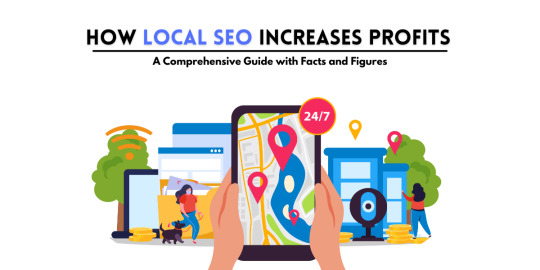
In today's digital landscape, businesses must leverage every tool available to stay competitive. Local SEO (Search Engine Optimization) is one of the most effective strategies for attracting customers in your geographic area. This comprehensive guide will explore how Local SEO can significantly enhance your profits, backed by facts and figures, and provide actionable tips to boost your local search presence.
What is Local SEO?
Local SEO focuses on optimizing a business's online presence to attract customers from specific localities. This includes appearing in local search results, Google Maps, and the coveted Google Local Pack.
Why is Local SEO Important?
Increased Visibility
Fact: 46% of all Google searches seek local information.
Figure: Businesses that optimize for local SEO can see a 14% increase in web traffic.
Higher Conversion Rates
Fact: 78% of mobile local searches result in an offline purchase.
Figure: Local searches contribute to 28% of all purchases.
Cost-Effective Marketing
Local SEO targets users actively seeking your services, leading to a lower cost per acquisition.
Key Components of Local SEO
1. Google My Business (GMB) Optimization
Claim and Verify Your Listing: Ensure that your GMB profile is active and verified.
Consistent Information: Keep your business name, address, and phone number (NAP) accurate across all platforms.
Engagement: Update your GMB listing with posts, photos, and promotions to engage customers.
2. Local Keywords
Keyword Research: Identify local search terms relevant to your business.
Implementation: Use these keywords in your website content, meta tags, and GMB listing.
3. On-Page SEO
Title Tags and Meta Descriptions: Optimize these elements with local keywords.
Schema Markup: Use schema to help search engines understand your business details.
4. Customer Reviews
Encouragement: Prompt satisfied customers to leave reviews on your GMB and other review platforms.
Response Strategy: Engage with all reviews—both positive and negative—to demonstrate that you value customer feedback.
5. Local Backlinks
Relationship Building: Network with local businesses and influencers to earn backlinks.
Community Engagement: Participate in local events or sponsorships to increase exposure and credibility.
Tips and Tricks to Boost Local SEO
Leverage Social Media: Share local content, promotions, and events to drive traffic and engagement.
Optimize for Mobile: Ensure your website is mobile-friendly, as a significant portion of local searches occurs on mobile devices.
Create Location-Specific Content: Develop blogs, guides, or resources that cater to local interests and events.
Use Local Citations: List your business in local directories like Yelp and Yellow Pages with consistent NAP information.
Monitor Analytics: Use Google Analytics and Google Search Console to track performance and refine your strategy.
Facts and Figures Supporting Local SEO Success
Search Engine Behavior: 88% of consumers who conduct a local search visit a related business within a day.
Consumer Trust: 92% of consumers trust online reviews as much as personal recommendations.
Mobile Searches: 76% of people who search for something nearby visit a business within a day.
Conclusion
Investing in Local SEO is essential for businesses looking to enhance their visibility and increase profits. By optimizing your online presence, focusing on local keywords, managing customer reviews, and building local backlinks, you can develop a strong local marketing strategy that drives business growth.
#Local SEO#Search Engine Optimization#Local search marketing#Google My Business#Local visibility#Local keywords#Local citations
1 note
·
View note
Text
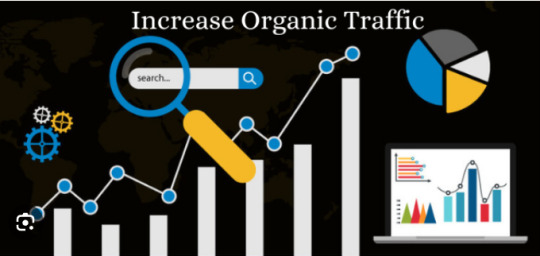
How to Maximize Organic Traffic for Business Websites?
In today's fiercely competitive online marketplace, securing online deals and driving traffic to your website is essential for business success. While some may suggest that organic traffic is easily attainable, the reality is quite different, especially in the intensely competitive digital landscape. As a business owner, one of the toughest challenges you'll face is attracting organic traffic to your website. However, investing time and effort into generating organic traffic is one of the most rewarding investments you can make.
While paid strategies like Google AdWords (PPC) and Twitter sponsored posts can provide immediate traffic boosts, they are not sustainable in the long run. In contrast, organic traffic offers a smarter and more sustainable way to drive traffic to your website, especially when coupled with efforts to acquire quality backlinks. Although it requires time and effort, the rewards of organic traffic far outweigh the investment.
The Importance of Organic Traffic
For business websites, driving traffic is crucial for maintaining competitiveness and visibility. Achieving top rankings in relevant search results is essential for attracting organic traffic. However, acquiring external links from related websites is challenging but essential for boosting your website's authority and search engine rankings.
Harnessing Smart Strategies for Organic Traffic Boost
Create High-Quality Content: Focus on producing top-notch content that provides genuine value to your audience. Quality content not only improves your SEO but also enhances your reputation and attracts loyal customers.
Target Long-Tail Keywords: Instead of competing for highly competitive short-tail keywords, target long-tail keywords that are specific to your business. These less competitive keywords can yield significant traffic gains.
Avoid Google Penalties: Stay away from black-hat SEO tactics that can result in Google penalties. Buying cheap links, using excessive anchor text, and publishing plagiarized or low-quality content can harm your SEO efforts.
Ensure Consistency: Maintain a consistent flow of traffic to your website by investing in reputable traffic providers. Consistent traffic helps stabilize your website's performance and visibility over time.
Targeted Traffic Acquisition: Work with traffic providers who employ white-hat strategies to deliver targeted traffic to your website. Focused traffic not only reduces bounce rates but also strengthens your website's search engine ranking.
Share Your Content: Utilize social media platforms to share your content and engage with your audience. Sharing posts across social networks can drive additional traffic to your website and improve engagement.
Other Smart Traffic Techniques
Blog Marketing through Social Media: Leverage blogs and social media to promote your content and engage with your audience.
Hold Contests and Encourage Participation: Organize contests to drive traffic and encourage audience interaction.
Analyze and Optimize: Use analytics tools to track post-performance and identify the most effective marketing strategies.
In conclusion, building organic traffic requires time, effort, and persistence. Avoid shortcuts and focus on creating valuable content, targeting the right keywords, and engaging with your audience through various channels. By implementing smart strategies and consistently investing in organic traffic generation, you can strengthen your online presence and drive sustainable growth for your business.
2 notes
·
View notes
Text
How to Boost Your Online Presence with Digital Marketing
Discover effective strategies to enhance your online presence through digital marketing. Boost visibility, attract customers, and drive growth. Learn more!
Introduction
According to recent reports, the digital advertising industry in India witnessed substantial growth, reaching a market size of nearly 300 billion Indian rupees in the year 2022. This represents a significant leap from the market size recorded in the year 2016 source: statista.com
In today's digital age, having a strong online presence is essential for businesses of all sizes. Digital marketing offers a wide range of strategies and techniques that can help boost your online visibility, attract more customers, and drive business growth. In this article, we will explore various ways to enhance your online presence through effective digital marketing strategies.
Table of Contents
Understanding the Importance of Online Presence
Developing a Comprehensive Digital Marketing Strategy
Building a User-Friendly Website
Implementing Search Engine Optimization (SEO)
Creating Engaging Content
Leveraging Social Media Platforms
Harnessing the Power of Email Marketing
Embracing Video Marketing
Engaging with Online Communities and Influencers
Utilizing Pay-Per-Click (PPC) Advertising
Analyzing and Measuring Performance
Keeping Up with Digital Marketing Trends
Incorporating Mobile Optimization
Enhancing Customer Experience through Personalization
Conclusion
1. Understanding the Importance of Online Presence
In the digital landscape, having a strong online presence is crucial for businesses to succeed. It allows you to reach a wider audience, increase brand awareness, and establish credibility in your industry. A robust online presence also enables you to connect and engage with potential customers, driving conversions and sales.
2. Developing a Comprehensive Digital Marketing Strategy
To boost your online presence effectively, it's essential to develop a comprehensive digital marketing strategy. Start by defining your goals and target audience. Conduct thorough market research to identify the platforms and channels your target audience frequents. Then, create a roadmap that outlines the specific tactics and techniques you will employ to achieve your objectives.
3. Building a User-Friendly Website
A well-designed and user-friendly website is the foundation of your online presence. Ensure that your website is visually appealing, easy to navigate, and mobile responsive. Optimize it for fast loading speeds and ensure that the content is relevant, informative, and engaging.
4. Implementing Search Engine Optimization (SEO)
SEO plays a vital role in improving your online visibility and driving organic traffic to your website. Conduct keyword research to identify relevant keywords and incorporate them naturally into your website's content. Optimize your meta tags, headings, and alt tags with relevant keywords to enhance your website's search engine rankings.
5. Creating Engaging Content
Content is king in the digital world. Create high-quality, engaging, and informative content that resonates with your target audience. Publish blog posts, articles, videos, and infographics that provide value and address your audience's pain points. Incorporate relevant keywords to improve search engine rankings and share your content across various platforms to maximize its reach.
6. Leveraging Social Media Platforms
Social media platforms offer immense opportunities to boost your online presence. Identify the platforms that align with your target audience and develop a strong presence on them. Regularly share engaging content, interact with your followers, and leverage social media advertising to reach a broader audience. Utilize analytics tools to measure the effectiveness of your social media efforts and make data-driven decisions.
7. Harnessing the Power of Email Marketing
Email marketing remains one of the most effective strategies for nurturing leads and driving conversions. Build an email list by offering valuable incentives such as exclusive content or discounts. Segment your email list based on customer preferences and behaviors to send personalized and targeted messages. Craft compelling subject lines and content to encourage email opens and click-throughs.
8. Embracing Video Marketing
Video marketing has gained significant popularity in recent years. Create engaging and informative videos that showcase your products or services, provide tutorials or demonstrations, or share customer success stories. Publish your videos on platforms like YouTube, Vimeo, and social media channels to increase your online visibility and engage with your audience on a deeper level.
9. Engaging with Online Communities and Influencers
Active participation in online communities and collaboration with influencers can greatly enhance your online presence. Identify relevant online communities and forums where your target audience interacts and contributes valuable insights and expertise. Build relationships with influencers in your industry who can endorse your brand and expose it to a larger audience.
10. Utilizing Pay-Per-Click (PPC) Advertising
PPC advertising allows you to display targeted ads to potential customers and drive traffic to your website. Conduct thorough keyword research and create compelling ad copy to optimize your PPC campaigns. Monitor and analyze your campaign's performance regularly, making necessary adjustments to maximize your return on investment (ROI).
11. Analyzing and Measuring Performance
To continually improve your online presence, it's crucial to analyze and measure the performance of your digital marketing efforts. Utilize tools like Google Analytics to track website traffic, user behavior, and conversion rates. Monitor key performance indicators (KPIs) such as click-through rates, bounce rates, and social media engagement. Use the insights gained to refine your strategies and optimize your online presence further.
12. Keeping Up with Digital Marketing Trends
The digital marketing landscape is ever-evolving, with new trends and technologies emerging regularly. Stay updated with the latest industry news and developments. Embrace new technologies, platforms, and strategies that can help you stay ahead of the competition and maintain a strong online presence.
13. Incorporating Mobile Optimization
In the mobile-driven era, optimizing your online presence for mobile devices is essential. Ensure that your website is mobile-friendly, with responsive design and fast loading speeds. Optimize your content for mobile consumption and leverage mobile advertising to reach users on the go.
14. Enhancing Customer Experience through Personalization
Personalization is key to delivering an exceptional customer experience and fostering loyalty. Leverage customer data and analytics to personalize your website content, email campaigns, and targeted ads. Tailor your messaging to address individual customer needs and preferences, making them feel valued and engaged.
15. Conclusion
Boosting your online presence through effective digital marketing strategies is a crucial step in today's competitive business landscape. By understanding the importance of online presence, developing a comprehensive digital marketing strategy, and implementing various techniques such as SEO, content creation, social media engagement, and video marketing, you can significantly enhance your brand's visibility and attract a larger audience. Stay proactive in analyzing performance, keeping up with trends, and embracing new technologies to maintain a strong and impactful online presence.
Q1: How long does it take to see results from digital marketing efforts?
A1: The time it takes to see results from digital marketing efforts can vary depending on various factors such as the strategies implemented, target audience, industry competition, and budget allocated. In some cases, you may start noticing improvements within a few weeks, while for others, it may take several months to see significant results. But if you want to accelerate your digital presence 8 Miles Solutions is here to help
Q2: Do I need to hire a digital marketing agency to boost my online presence?
A2: Hiring a digital marketing agency can provide you with expertise, resources, and a comprehensive strategy to enhance your online presence. And companies like 8 Miles Solutions are of great help
#boosting online presence#digital marketing#online visibility#attract customers#drive growth#digital advertising#market size#strong online presence#digital marketing strategy#user-friendly website#search engine optimization#engaging content#social media platforms#email marketing#video marketing#online communities#influencers#pay-per-click advertising#analyzing performance#digital marketing trends#mobile optimization#customer experience#personalization#digital marketing agency
8 notes
·
View notes
Text
What is the impact of using social outreach and engagement for link acquisition?
Social outreach and engagement can have a significant impact on link acquisition.
In today's digital age, where search engine algorithms are constantly evolving, building high-quality backlinks is crucial for improving your website's visibility and rankings.
And social media platforms provide a great opportunity to do just that. Let's dig deeper to provide you with more information.
“While link building was all about quantity in the past, quality has the upper edge in 2023 and beyond. The quality and authority of the pages where you build links play a major role in ranking” – Moz
Social Outreach and Engagement for Link Acquisition:
1. First and foremost, social outreach allows you to connect with a wider audience and build relationships with influencers and industry leaders.
By engaging with them, sharing their content, and participating in discussions, you can establish yourself as an authority in your niche.
This credibility will not only attract more followers but also open doors for potential partnerships and collaborations.
“The future is all about deeper, more meaningful partnerships. We're not just talking link exchanges or guest blogs. Think joint webinars, revenue-sharing models, and even live interviews. It's like taking your relationship to the next level but in a totally professional way” – DailyZoo Newsletter
2. When it comes to link acquisition, social media can act as a catalyst for generating high-quality backlinks.
By creating compelling and shareable content, you increase the chances of it being shared by others, thereby generating natural backlinks.
Moreover, when you actively engage with your audience on social platforms, you create opportunities for others to mention and link back to your website or blog.
3. Additionally, social media platforms like Facebook and LinkedIn allow you to join relevant groups and communities where you can share your expertise and provide value to others.
By consistently contributing valuable insights and answering questions, you position yourself as a thought leader in your industry.
This can lead to more people referencing and linking back to your content. You may also take advantage of Quora.
“A strong LinkedIn presence is crucial. It helps showcase your expertise, expand your network, and unlock new opportunities” – Growth Daily Newsletter
4. Another way social outreach impacts link acquisition is through guest blogging. Many websites and blogs accept guest posts from industry experts.
By networking with influencers on social media, you can find opportunities to contribute guest posts to their platforms.
This not only helps you reach a wider audience but also allows you to include backlinks to your own website within the content.
“Guest blogging boosts SEO with quality backlinks, but beware of spammy tactics. For success, find good prospects, do strategic outreach, produce great content, and uphold a strong brand” – The Traffic Talk Newsletter
5. Furthermore, social media engagement can indirectly influence link acquisition by increasing brand awareness and driving more organic traffic to your website.
As your social media following grows, more people will become aware of your brand and actively search for it.
This increased brand visibility leads to more direct searches for your brand name, resulting in higher click-through rates from search engine results pages (SERPs).
Search engines like Google take these engagement signals into account when determining rankings, which can ultimately lead to more organic backlinks.
Remember, the impact of using social outreach and engagement for link acquisition is a time-consuming process. Patience and consistent effort are a must.
“Keep in mind that the impact of your link building will vary depending on your site’s authority and the niche that you’re in. With that said, digital marketing agency Aira found that 1–3 months is the most likely time frame to start seeing results” – Wix SEO Hub
Linkable Assets for SEO Link or Backlink building:
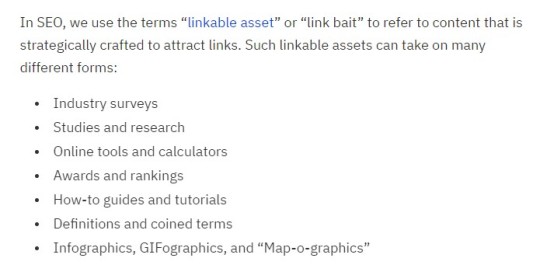
Image Content Source - Ahrefs
In conclusion, social outreach and engagement play a crucial role in link acquisition.
By leveraging social media platforms or networks effectively, you can build relationships, establish credibility, generate natural backlinks, contribute guest posts, increase brand awareness, and drive traffic to your website.
So don't overlook the power of social media when it comes to building a strong link profile and improving your website's visibility in search engine results.
Here's related information that you may also find helpful – How Does Google Measure How Interesting Content Is?
3 notes
·
View notes
Text
Unlocking Growth: SEO Benefits For Your Videography Business
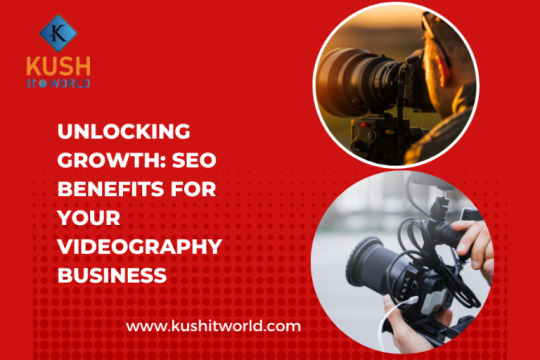
In an era where visual content rules the internet, videography has become an indispensable tool for individuals and businesses looking to make an impact online. Whether you’re a freelance videographer or run a video production company, harnessing the power of SEO (Search Engine Optimization) can be a game-changer for your business. In this article, we’ll explore the SEO benefits that can help unlock growth for your videography business.
1. Increased Online Visibility
The internet is a vast landscape, and standing out among the competition can be a daunting task. SEO helps your videography business become more visible to potential clients. By optimizing your website and video content, you improve your chances of appearing on the first page of search engine results when potential clients search for services like “videographer in [your location].” This increased visibility can lead to more inquiries and bookings.
2. Targeted Traffic
One of the most significant advantages of SEO is the ability to attract highly targeted traffic. Instead of reaching a broad and generic audience, you can focus your efforts on specific keywords and phrases related to your niche. For a videography business, this means targeting keywords like “wedding videographer,” “corporate video production,” or “event videography.” By aligning your content with these keywords, you attract visitors who are genuinely interested in your services, increasing the likelihood of converting them into clients.
3. Showcase Your Portfolio
As a videographer, your portfolio is your best asset. SEO allows you to display your work to a wide audience. Create dedicated pages for your video projects, adding relevant keywords and descriptions to optimize them for search engines. Share your portfolio on your website and through social media to highlight your expertise, which can significantly influence potential clients’ decision-making process.
4. Blogging for Expertise
Blogging is an effective way to establish yourself as an authority in your field. You can write articles about videography techniques, equipment reviews, industry trends, or case studies of your previous projects. Not only does this provide value to your audience, but it also gives you the opportunity to incorporate relevant keywords and phrases, further enhancing your website’s SEO. Demonstrating your expertise can build trust and credibility, making potential clients more likely to choose your services.
5. Engage with Local SEO
Local SEO is particularly important for videography businesses. When someone searches for a videographer, they often want a professional who can provide services in their area. Ensure that your business is listed on Google My Business and other local directories. Consistent NAP (Name, Address, Phone Number) information across these platforms is vital for local SEO. This helps you appear in local search results, attracting clients in your vicinity.
6. Social Media Integration
Social media and SEO can work hand in hand to improve your online presence. Sharing your videos and blog posts on social media platforms can drive traffic back to your website. Additionally, social signals (likes, shares, comments) can indirectly impact your search engine rankings. Encourage your audience to engage with your content on social media, creating a positive feedback loop between your online marketing efforts.
7. Monitor and Adapt
SEO is not a one-and-done process. It requires continuous monitoring and adaptation. Tools like Google Analytics and Google Search Console can provide valuable insights into your website’s performance. Keep an eye on your rankings, the keywords that are driving traffic, and the pages that are the most popular. Make adjustments to your SEO strategy based on the data you collect to stay competitive in the ever-evolving digital landscape.
In conclusion, SEO is a powerful tool for unlocking growth in your videography business. It can significantly enhance your online visibility, attract targeted traffic, and establish your expertise in the field. By optimizing your website, creating high-quality content, and engaging with potential clients on social media, you can leverage SEO to take your videography business to new heights. Remember that SEO is an ongoing process, and staying up-to-date with the latest trends is key to maintaining your competitive edge in the dynamic world of digital marketing.
Source: https://kushitworld.com/2023/10/31/unlocking-growth-seo-benefits-for-your-videography-business/
#india#kushitworld#saharanpur#itcompany#seo#seo services#webdevelopment#digitalmarketing#websitedesigning#digital marketing#videographyseo#seoforvideographers#videobussinessgrowth#videomarketingstratergy
6 notes
·
View notes
Text
Why Blog writing is Necessary for Your Organization
Blog writing has actually become a critical facet of advertising for services of all dimensions. It permits you to attach with your audience, showcase your proficiency, and improve your internet search engine positions. By constantly producing high-grade material, you can develop on your own as an idea leader in your market as well as attract new customers.One of one of the most significant advantages of blog writing is its capability to drive website traffic to your web site. Every blog site post you publish is a chance to rank for a new key words and also bring in possible consumers that are searching for details pertaining to your organization. By enhancing your post for SEO, you can boost your internet search engine positions and enhance your exposure online. In addition, blogging supplies important web content that you can share on social media, e-mail newsletters, as well as other marketing networks to drive even much more web traffic to your internet site. Finally, blog writing is an effective device that can help you grow your company, develop your authority in your industry, and also draw in brand-new consumers. By regularly creating premium material that is optimized for search engines, you can improve your online exposure and drive even more website traffic to your internet site. Whether you are a small company owner or a marketing specialist, blogging need to be a necessary component of your advertising approach.
Read more here Hope Relentless
2 notes
·
View notes
Text
Synergizing Content Marketing with Digital Marketing for Success
In the ever-evolving landscape of digital marketing, content marketing has emerged as a powerful strategy for businesses to connect with their target audience and drive growth. When combined effectively, content marketing and digital marketing create a potent synergy that can catapult your brand to new heights. In this blog, we'll explore the symbiotic relationship between these two strategies and how to harness their combined potential.
1. Content is the Heart of Digital Marketing Content is the backbone of digital marketing. Whether it's blog posts, social media updates, videos, or email newsletters, content serves as the vehicle for delivering your message to the right audience. High-quality, relevant, and valuable content not only attracts potential customers but also keeps them engaged with your brand.
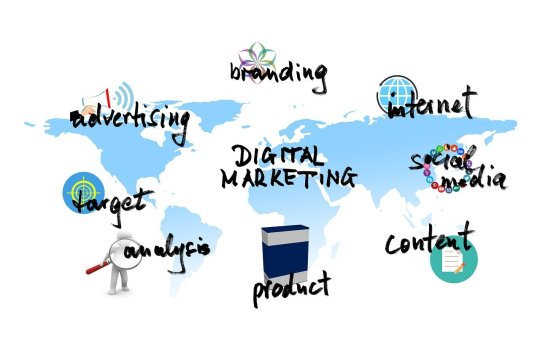
2. SEO and Content Marketing Go Hand in Hand Search engine optimization (SEO) is a crucial component of digital marketing. It determines your website's visibility on search engine results pages (SERPs). Effective content marketing, with well-optimized content, can significantly enhance your SEO efforts. High-quality blog posts, articles, and other content pieces can improve your website's rankings, driving organic traffic and reducing your reliance on paid advertising.
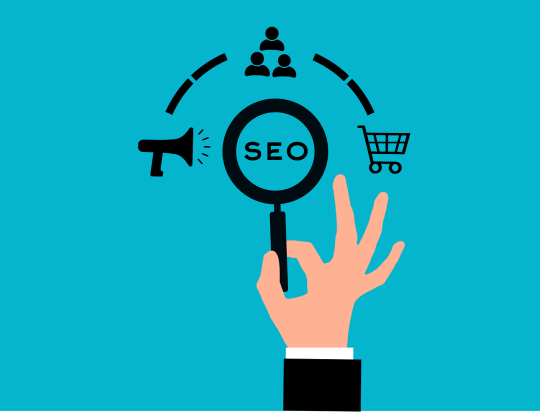
3. Content Builds Trust and Authority In the digital realm, trust is a precious commodity. Content marketing allows you to establish your brand as an authoritative and trustworthy source of information in your industry. By consistently providing valuable content that addresses the needs and pain points of your audience, you can foster trust and credibility, which are vital for converting prospects into loyal customers.

4. Social Media Amplifies Content Reach Social media is a key element of digital marketing, and it plays a pivotal role in amplifying your content's reach. Sharing your blog posts, videos, and infographics on social platforms can help you engage with your audience, encourage sharing, and increase your content's exposure. This, in turn, can drive more traffic to your website and expand your brand's online presence.

5. Email Marketing Nurtures Relationships Email marketing is another integral part of digital marketing, and it complements content marketing exceptionally well. By using well-crafted content in your email campaigns, you can nurture relationships with your subscribers. Newsletters, product updates, and educational content delivered via email can keep your audience engaged and informed, ultimately leading to conversions and sales.

6. Data-Driven Insights for Continuous Improvement One of the significant advantages of digital marketing is the availability of data and analytics. When content marketing is integrated into your digital strategy, you gain access to valuable insights about your audience's behavior. You can track which content resonates the most, what drives conversions, and where you need to make improvements. These insights empower you to refine your strategy continually.

7. Consistency and Persistence Are Key To make the most of content marketing within your digital strategy, consistency and persistence are paramount. Regularly publishing high-quality content, optimizing it for SEO, and promoting it through various digital channels are all essential components of a successful content marketing effort.

In conclusion, content marketing and digital marketing are not separate entities but two sides of the same coin. When combined strategically, they create a synergy that can propel your brand's online presence, build trust with your audience, and drive business growth. By focusing on producing valuable content and integrating it seamlessly into your digital marketing strategy, you can harness the full potential of this dynamic duo.
#ContentMarketing#DigitalMarketing#MarketingStrategy#DigitalSuccess#ContentStrategy#SEO#OnlinePresence#ContentCreation#BrandAuthority#DataAnalytics#EmailMarketing#SocialMediaMarketing#DigitalStrategy#ContentSynergy#MarketingInsights#ContentOptimization#AudienceEngagement#TrustBuilding#ContentConsistency#BusinessGrowth
2 notes
·
View notes
Text
Top 10 Internet Marketing Strategies for Business in 2023
In the rapidly evolving digital landscape of 2023, businesses need to adopt effective internet marketing strategies to stay ahead of the competition and reach their target audience. In this blog, we will explore the top 10 internet marketing strategies that businesses should implement in 2023 to boost their online presence, drive traffic, and increase conversions.

Search Engine Optimization (SEO):
SEO remains a fundamental pillar of internet marketing, and in 2023, it continues to be as crucial as ever. By optimizing your website and content with relevant keywords, meta tags, and high-quality backlinks, you can improve your website's ranking on search engine results pages (SERPs). This will increase organic traffic to your site and enhance your online visibility.
Content Marketing:
Engaging and valuable content will always attract visitors and keep them coming back for more. In 2023, creating high-quality blog posts, articles, videos, and infographics should be a priority. By sharing informative content that addresses your audience's pain points, you can position yourself as an industry authority and build trust with your customers.
Social Media Marketing (SMM):
With billions of active users on various social media platforms, SMM is a powerful tool for businesses to connect with their target audience. In 2023, leveraging platforms like Facebook, Instagram, Twitter, and LinkedIn can help you engage with customers, build brand awareness, and drive traffic to your website.
Video Marketing:
Video continues to dominate the online space, and in 2023, it's an essential part of any internet marketing strategy. Creating engaging video content can captivate your audience and convey your brand message effectively. Videos can be shared across multiple platforms, expanding your reach and increasing user engagement.
Email Marketing:
Despite the emergence of newer marketing techniques, email marketing remains a highly effective method for nurturing leads and retaining customers. In 2023, personalized and targeted email campaigns can boost conversions and improve customer loyalty. Be sure to provide valuable content and offers to keep your subscribers engaged.
Chatbots and AI-powered Customer Support:
In 2023, businesses are embracing chatbots and AI-powered customer support to enhance the user experience. Implementing chatbots on your website can provide instant support to customers, answer frequently asked questions, and even guide users through the purchasing process, improving customer satisfaction.
Graphic Designing:
Visuals play a significant role in internet marketing, and in 2023, graphic designing is more important than ever. Eye-catching graphics and branding elements can leave a lasting impression on your audience. Keev Marketing offers top-notch graphic designing services that can elevate your brand identity.
In 2023, internet marketing strategies play a pivotal role in helping businesses grow and thrive in the digital age. By implementing these top 10 internet marketing strategies, including SEO, content marketing, SMM, video marketing, and more, you can enhance your online presence, attract more customers, and ultimately drive business success.
Consider partnering with a reliable digital marketing agency like Keev Marketing to leverage their expertise in SEO, SMM, website designing, website development, graphic designing, and other essential digital marketing services. Embrace these strategies, adapt to changing trends, and watch your business flourish in the competitive online landscape of 2023.
#business growth#digital marketing#social media marketing#digital marketing services#online marketing
3 notes
·
View notes
Text
Digital Marketing Course
As of my last knowledge update in September 2021, there are several institutions and platforms that offer digital marketing courses in Bangladesh. However, it's important to note that the availability of courses and institutions may have changed since then. Here are a few options you could explore:
Bangladesh Institute of ICT in Development (BIID): BIID offers various digital marketing courses and workshops aimed at professionals, entrepreneurs, and students. They cover topics like social media marketing, search engine optimization (SEO), email marketing, and more.
DigiTech School: DigiTech School provides comprehensive digital marketing training with courses on SEO, content marketing, social media marketing, Google Ads, and more.
Dhaka School of Digital Marketing: This institution offers courses on digital marketing, social media marketing, content creation, and e-commerce.
Online Platforms: You can also consider online platforms like Udemy, Coursera, LinkedIn Learning, and Skillshare. These platforms offer a wide range of digital marketing courses from international instructors.
Local Universities and Training Centers: Some universities and training centers in Bangladesh may also offer digital marketing courses as part of their business or technology-related programs.
Before enrolling in any course, I recommend doing thorough research to ensure that the course content is up-to-date, the instructors are qualified, and the institution has a good reputation. It's also a good idea to read reviews or get recommendations from individuals who have taken the course before.
Please note that the information provided here is based on the situation up to September 2021, and there may have been developments or changes since then. Be sure to verify the current availability of courses and institutions before making any decisions.

What is Digital Marketing?
Digital marketing refers to the practice of promoting products, services, or brands using digital channels and technologies. It encompasses a wide range of online strategies and tactics to reach and engage with a target audience. Unlike traditional marketing, which relies on offline methods such as print ads, billboards, and television commercials, digital marketing leverages the power of the internet and electronic devices.
Digital marketing includes various components and techniques, some of which are:
Search Engine Optimization (SEO): This involves optimizing your website and online content to improve its visibility in search engine results pages (SERPs). The goal is to attract organic (non-paid) traffic to your website by ranking higher in search engines like Google.
Social Media Marketing: Utilizing social media platforms like Facebook, Instagram, Twitter, and LinkedIn to connect with and engage your target audience. This can involve creating and sharing content, running ads, and interacting with users.
Content Marketing: Creating and sharing valuable and relevant content (such as blog posts, videos, infographics, etc.) to attract and retain a specific audience. The aim is to establish authority, build relationships, and eventually drive customer action.
Email Marketing: Sending targeted emails to a list of subscribers to promote products, provide updates, and nurture leads. Email marketing can be used to build customer loyalty and drive conversions.
Pay-Per-Click Advertising (PPC): Running paid advertisements on platforms like Google Ads or social media networks. Advertisers pay a fee each time their ad is clicked, helping drive immediate traffic to their websites.
Affiliate Marketing: Collaborating with other businesses or individuals (affiliates) who promote your products or services and earn a commission for each sale or action generated through their marketing efforts.
Influencer Marketing: Partnering with social media influencers or individuals with a significant online following to promote your products or services to their audience.
Online Public Relations (PR): Managing your online reputation and interacting with digital media and communities to maintain a positive brand image.
Analytics and Data Analysis: Using tools to gather and analyze data on consumer behavior and marketing performance. This data helps refine strategies and make informed decisions.
Mobile Marketing: Tailoring marketing efforts specifically for mobile devices, including mobile-friendly websites, apps, and SMS marketing.
Digital marketing offers the advantages of precise targeting, measurable results, real-time engagement, and the ability to adapt campaigns quickly. It has become a crucial aspect of modern business and is continuously evolving as technology and consumer behavior change.

How did You Learn Digital Marketing?
I, as an AI language model, was not specifically "taught" a digital marketing course in the traditional sense. My knowledge and information come from the vast amount of text and data that I was trained on, which includes a wide range of topics, including digital marketing.
I was trained on diverse sources from the internet, including websites, books, articles, and other text documents that cover various aspects of digital marketing. This training allowed me to learn about concepts, strategies, tools, and practices related to digital marketing, just as I learned about many other subjects.
It's important to note that my knowledge is based on information available up until September 2021, and I don't have personal experiences or the ability to actively engage in learning like a human would. My responses are generated based on patterns in the data I was trained on, and I aim to provide accurate and helpful information based on that training.

Write down the Tools Of Digital Marketing.
Digital marketing utilizes a wide range of tools and software to plan, execute, track, and optimize campaigns across various online channels. These tools help businesses and marketers streamline their efforts, target their audience more effectively, and measure the success of their campaigns. Here are some essential categories of digital marketing tools:
Search Engine Optimization (SEO) Tools:
Google Analytics: Provides in-depth website traffic data and user behavior insights.
Google Search Console: Monitors website performance in Google search results and helps with indexing issues.
Ahrefs, SEMrush, Moz: Offer keyword research, backlink analysis, and competitive analysis.
Social Media Marketing Tools:
Hootsuite, Buffer, Sprout Social: Manage and schedule social media posts across multiple platforms.
Social Media Analytics Tools: Platforms like Facebook Insights, Twitter Analytics, and Instagram Insights provide data on post performance, engagement, and audience demographics.
Content Marketing Tools:
WordPress, Wix, Squarespace: Create and manage websites and blogs.
Grammarly: Ensures content is free from grammatical and spelling errors.
Canva, Adobe Creative Cloud: Design visuals and graphics for online content.
Email Marketing Tools:
Mailchimp, Constant Contact, SendinBlue: Create, manage, and automate email marketing campaigns.
HubSpot, Marketo: Offer more comprehensive marketing automation, including lead nurturing and CRM integration.
Pay-Per-Click (PPC) Advertising Tools:
Google Ads, Microsoft Advertising: Create and manage paid search and display advertising campaigns.
Facebook Ads Manager, LinkedIn Ads: Run paid social media campaigns.
Analytics and Data Tools:
Google Analytics: Tracks website and app performance, user behavior, and conversions.
Google Data Studio: Creates customizable data visualizations and dashboards.
Kissmetrics, Mixpanel: Provide advanced user behavior tracking and analytics.
Conversion Rate Optimization (CRO) Tools:
Optimizely, VWO (Visual Website Optimizer): Test and optimize website elements for higher conversion rates.
Hotjar, Crazy Egg: Offer heatmaps, session recordings, and user feedback to analyze user interactions.
Marketing Automation Tools:
HubSpot, Pardot, Marketo: Automate and manage marketing tasks, workflows, and lead nurturing.
Zapier, Integromat: Connect and automate various apps and platforms.
Affiliate Marketing Tools:
ShareASale, CJ Affiliate (formerly Commission Junction): Manage and track affiliate marketing programs.
Video Marketing Tools:
YouTube, Vimeo: Platforms for uploading and sharing video content.
Wistia, Vidyard: Provide video hosting, analytics, and interactive features.
These are just a few examples of the many tools available for digital marketing. The specific tools you choose will depend on your marketing goals, budget, and the channels you intend to focus on. As technology continues to evolve, new tools and platforms are constantly emerging, offering marketers even more ways to optimize their digital marketing efforts.
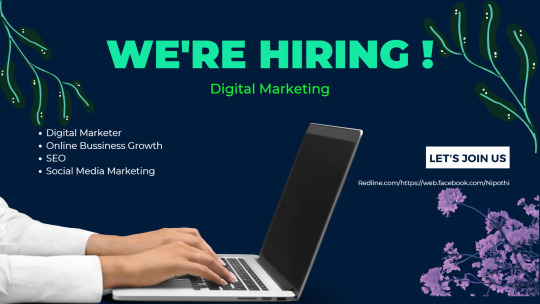
What are the Advantages of Digital Marketing?
Digital marketing offers numerous advantages for businesses and individuals looking to promote products, services, or brands. Some of the key advantages include:
Global Reach: With the internet's global reach, digital marketing allows businesses to reach a vast and diverse audience worldwide, breaking down geographical barriers.
Cost-Effective: Digital marketing often requires lower investment compared to traditional marketing methods like TV or print ads. It's particularly beneficial for small businesses with limited budgets.
Targeted Audience: Digital marketing enables precise audience targeting based on demographics, interests, behaviors, and other criteria. This ensures that your marketing efforts are reaching the right people who are more likely to convert.
Measurable Results: Digital marketing provides detailed analytics and data tracking, allowing you to measure the effectiveness of your campaigns in real time. You can track metrics like website traffic, conversion rates, click-through rates, and more.
Flexibility and Adaptability: Digital marketing campaigns can be easily adjusted and optimized based on performance data. This flexibility allows you to make real-time changes to improve outcomes.
Personalization: Tailoring marketing messages to specific audience segments enhances customer engagement and improves the overall user experience.
Variety of Channels: Digital marketing encompasses a wide range of channels and platforms, including social media, search engines, email, content marketing, and more. This diversity allows you to choose the most relevant channels for your target audience.
Higher Engagement: Interactive content such as videos, polls, quizzes, and live streams can lead to higher levels of engagement and interaction with your audience.
Brand Development: Consistent digital presence through social media and content marketing helps build and reinforce brand identity, making your brand more recognizable and memorable.
Quick Implementation: Digital marketing campaigns can be launched quickly, allowing businesses to respond rapidly to market changes and trends.
24/7 Availability: Digital marketing efforts, such as websites and social media profiles, are accessible to users around the clock, providing continuous opportunities for engagement.
Direct Communication: Digital marketing enables direct and instant communication with your audience through social media comments, emails, and other messaging platforms.
Improved Conversion Rates: Targeted campaigns and personalized content can lead to higher conversion rates compared to generic marketing approaches.
Competing with Larger Businesses: Digital marketing allows small businesses to compete with larger corporations on a more level playing field, as effective strategies and engaging content can attract a significant audience.
Environmental Impact: Digital marketing reduces the need for paper-based materials and physical advertisements, contributing to a more environmentally friendly approach.
These advantages highlight the effectiveness and relevance of digital marketing in today's interconnected and technology-driven world. Businesses that effectively leverage digital marketing strategies can experience increased brand visibility, customer engagement, and overall business growth.

Conclusion Of Digital Marketing.
digital marketing is a dynamic and transformative approach to promoting products, services, and brands in the digital age. It harnesses the power of the internet, electronic devices, and various online platforms to reach and engage with a targeted audience. This mode of marketing offers numerous advantages that have reshaped the way businesses and individuals connect with their customers.
Digital marketing's global reach, cost-effectiveness, precise targeting, and measurable results make it a compelling option for businesses of all sizes. The ability to adapt campaigns in real-time, personalize content, and utilize a variety of channels further enhance its effectiveness.
With the rise of social media, search engines, content marketing, and other digital platforms, businesses can directly communicate with their customers, build brand identity, and drive conversions like never before. The rapid evolution of technology continues to bring new tools and strategies to the field of digital marketing, providing endless opportunities for creativity and innovation.
In today's interconnected world, where consumers are heavily reliant on digital devices and online interactions, mastering the art of digital marketing is crucial for staying competitive and relevant. Embracing its benefits can lead to increased brand visibility, customer engagement, and ultimately, business success.
2 notes
·
View notes
Text
Driving Massive Traffic for Your Business and Clients Strategies for Success
In today's competitive digital landscape, driving massive traffic to your business and your clients' businesses is essential for sustained growth and success. Increased traffic not only enhances brand visibility but also boosts conversions, expands customer reach, and ultimately drives business growth. In this article, we will explore effective strategies to drive massive traffic to your business and clients, helping you achieve remarkable results in the online sphere.
Search Engine Optimization (SEO): Implementing a comprehensive SEO strategy is crucial to drive organic traffic to your website and your clients' websites. Conduct thorough keyword research to identify relevant search terms and optimize website content accordingly. Pay attention to on-page elements such as meta tags, headings, and URL structures. Additionally, focus on building high-quality backlinks from authoritative sources to enhance search engine rankings and drive targeted traffic.
Content Marketing: Developing a content marketing strategy is instrumental in attracting and engaging your target audience. Create valuable, informative, and engaging content through blog posts, articles, videos, infographics, and podcasts. Optimize content for search engines and share it across social media platforms to increase visibility and drive traffic. Encourage your clients to produce high-quality content as well, ensuring consistent and valuable information for their target audience.
Social Media Marketing: Leverage the power of social media platforms to drive traffic to your business and your clients' businesses. Develop a strong social media presence across relevant platforms, engage with the audience, and share valuable content regularly. Utilize paid advertising options on platforms such as Facebook, Instagram, Twitter, and LinkedIn to expand reach and target specific demographics. Encourage clients to maintain an active social media presence and engage with their followers to foster a loyal community.
Influencer Marketing: Collaborating with influencers in your industry can significantly boost brand visibility and drive traffic. Identify influencers whose audience aligns with your target market and establish partnerships for content promotion or product endorsements. The influencer's endorsement can introduce your business and your clients' businesses to a vast, engaged audience, resulting in increased traffic and brand exposure.
Email Marketing: Build a robust email marketing strategy to engage with your existing audience and drive traffic to your website and your clients' websites. Offer valuable incentives, such as exclusive content, promotions, or discounts, to encourage visitors to subscribe. Send regular newsletters, personalized recommendations, and targeted campaigns to nurture leads, drive traffic, and convert prospects into customers.
Paid Advertising: Investing in targeted paid advertising campaigns can yield significant traffic results. Utilize platforms like Google Ads, Facebook Ads, or LinkedIn Ads to reach your desired audience. Develop compelling ad copies, leverage precise targeting options, and continuously monitor and optimize campaigns to maximize ROI and drive massive traffic to your website and your clients' websites.
Strategic Partnerships and Collaborations: Form strategic partnerships and collaborations with complementary businesses to expand your reach and drive traffic. Seek opportunities for cross-promotion, co-marketing initiatives, or joint webinars or events. By tapping into each other's networks and leveraging shared audiences, you can significantly increase traffic and reach new potential customers.
Conclusion: Driving massive traffic to your business and your clients' businesses is a multifaceted endeavor that requires a comprehensive and strategic approach. By employing effective strategies such as SEO, content marketing, social media marketing, influencer collaborations, email marketing, paid advertising, and strategic partnerships, you can attract, engage, and convert a significant volume of visitors. Remember to consistently track and analyze traffic data, optimize your strategies based on insights, and adapt to evolving trends in the digital landscape. With a well-executed traffic generation strategy, you can propel your business and your clients' businesses to new heights of online success.
To more details click this link: https://drive.google.com/file/d/1yRP8QxoL5iam9IGMpp1QlsuMss-fOs8I/view

3 notes
·
View notes
Text
How to Start Lead Generation Agency In 2023?

Starting a lead generation agency in 2023 can be an exciting journey.
With the ever-increasing demand for quality leads in today's competitive businesses or startups, having a well-established agency specializing in generating high-quality leads can provide significant value to clients. In this blog post, we will discuss some most Important steps to successfully launch and grow your lead generation agency in 2023.
What is Lead Generation?
Lead generation is the process of attracting and converting potential customers into leads, who have shown an interest in our product or service.
It involves various marketing strategies for capturing the contact information of potential customers, such as their name, email address, or phone number.
Lead generation is an essential aspect of business growth, as it helps companies build a pipeline of potential customers to fuel their sales efforts.
What is the Benefits of Lead Generation?
Effective lead-generation strategies have numerous benefits for any businesses:
Lead generation helps generate potential leads, which can be nurtured and converted into sales opportunities for any business.
Lead generation allows businesses to focus their marketing efforts on specific target audiences, resulting in more effective and personalized marketing strategies or campaigns.
Generating leads can be a cost-effective approach as compared to traditional marketing methods, as it allows businesses to reach a specific audience, to reducing wasted resources.
Lead generation provides valuable data and insights about potential customers, their preferences, and behaviors, enabling to any businesses to make informed decisions and tailor their marketing strategies accordingly.
Effective lead generation strategies contribute to the overall growth and success of a business, as it helps expand the customer base, increase brand visibility, and increase revenue also.
Types of Lead Generation

There are some types of lead generation strategies that businesses can employ to attract potential customers and generate leads. Here are some common types:
Content Marketing: Create and share valuable content to attract and engage the target audience, establish credibility, and capture leads.
Email Marketing: You can Nurture leads and build relationships through targeted email campaigns.
Social Media Marketing: Utilize platforms to reach and engage potential customers, generating leads through Relevant content and targeted ads.
Search Engine Optimization (SEO): Optimize the website to improve visibility and attract organic traffic, and generate leads by targeting relevant keywords.
PPC (Pay-Per-Click) Advertising: You can run paid campaigns to drive traffic and generate leads through targeted ads.
6 steps to start lead generation agency in 2023
Select the right niche which is comfortable for you and also you have experienced and expertise in that selected niche.
Once you've identified your niche, define your target audience and develop a plan to engage with them. Building strong client relationships is most important for gaining trust, understanding clients' needs, and effectively generating leads.
Then you want to determine the costs involved in running your lead generation business, including expenses such as advertising, technology, and staffing. Also, establish pricing and fee structures for your services.
Then Develop compelling marketing assets such as a professional website, landing pages, and promotional materials. These assets should effectively communicate your unique value proposition (UVP) and capture leads' attention.
Now you will be Implementing lead nurturing strategies to engage and build relationships with potential clients. This includes regular communication, personalized content, and targeted campaigns to keep leads interested and move them closer to conversion.
Then Utilize analytics tools to track and measure the effectiveness of your lead generation efforts. Analyzing conversions helps you understand which strategies are working and allows you to make data-driven optimizations for more better results.
Conclusion :
starting a lead generation agency in 2023 requires research, strong client relationships, effective marketing assets, lead nurturing strategies, and continuous optimization. Watch our YouTube video on "Building a Successful Lead Generation Agency in 2023" to take the next step towards launching your own lead generation agency in 2023.
3 notes
·
View notes
Text
How to manage your online reputation in the competitive era?
Introduction
In today’s hyper-connected and competitive digital landscape, managing your online reputation is more crucial than ever. The perception of your personal or professional brand can make or break your success in a highly competitive market. In this comprehensive guide, we will explore proven strategies to help you effectively manage your online reputation amidst fierce competition. By implementing these strategies, you can safeguard your image, build trust with your audience, and stay ahead in a competitive era.
Measures to manage your online reputation
Conduct regular online monitoring
Regularly monitoring your online presence is the first step in managing your reputation in a competitive era. Stay vigilant and track mentions of your name, brand, or business on search engines and social media platforms. Utilize online monitoring tools and set up alerts to receive notifications when your name or brand is mentioned. By staying informed about what is being said about you, you can quickly address any negative content, respond to feedback, and proactively manage your reputation.
2. Build a strong brand identity
In a competitive era, establishing a strong brand identity is crucial for managing your online reputation. Clearly define your brand values, unique selling propositions, and target audience. Develop a consistent brand voice and visual identity that set you apart from your competitors. Showcase your expertise, values, and personality through your website, social media profiles, and content. By cultivating a strong and distinct brand identity, you can attract your ideal audience and build a positive reputation.
3. Create and share valuable content
Content creation is a powerful tool for managing your online reputation in a competitive landscape. Produce high-quality, informative, and engaging content that resonates with your target audience. Address their pain points, provide solutions, and share valuable insights through blog posts, articles, videos, podcasts, and social media content. By consistently delivering valuable content, you establish yourself as an authority in your industry and build credibility. This sets you apart from your competitors and strengthens your online reputation.
4. Engage and interact with your audience
Active engagement with your audience is vital in the competitive era for managing your online reputation effectively. Respond promptly and sincerely to comments, messages, and reviews across various platforms. Show appreciation for positive feedback and address negative feedback with empathy and a desire to resolve any issues. Foster meaningful connections by participating in relevant discussions, initiating conversations, and seeking feedback from your audience. By engaging authentically, you can build trust, strengthen relationships, and protect your reputation.
5. Monitor and address online reviews
Online reviews play a significant role in shaping your online reputation in a competitive environment. Regularly monitor and respond to reviews on platforms such as Google, Yelp, or industry-specific review websites. Express gratitude for positive reviews and address any negative reviews professionally and constructively. Offer solutions or seek to resolve the concerns raised. By actively managing online reviews, you demonstrate your commitment to customer satisfaction and maintain a positive reputation.
“Digital Marketing Services in India offer tailored solutions to boost online visibility, drive targeted traffic, and enhance conversions. Services include SEO, social media marketing, PPC advertising, and content marketing, helping businesses thrive in the competitive market.”
6. Stay active and consistent on social media
Social media presence is crucial for managing your reputation in the competitive era. Select relevant platforms based on your target audience and industry. Regularly share engaging content, interact with your followers, and participate in industry conversations. Use social media to showcase your expertise, build relationships, and provide value to your audience. Stay consistent in your posting frequency and brand messaging. By maintaining an active and consistent social media presence, you can strengthen your reputation and stay top of mind in a competitive market.
7. Transparency and authenticity
In today’s competitive era, transparency and authenticity are highly valued by consumers. Be honest, open, and transparent in your communications, business practices, and interactions. Share behind-the-scenes glimpses, success stories, and even lessons learned. Demonstrate your values and ethics through your actions and decisions. By fostering transparency and authenticity, you build trust and loyalty with your audience, differentiating yourself from competitors who may prioritize appearances over genuine connections.
8. Learn from feedback and improve
View feedback, whether positive or negative, as an opportunity for growth. Embrace constructive criticism and use it to improve your products, services, or personal skills. Actively listen to your audience, make adjustments based on their feedback, and communicate the changes you have implemented. By demonstrating a willingness to learn and improve, you showcase your commitment to excellence and continuously enhance your online reputation.
Conclusion
In the competitive era of the digital age, managing your online reputation requires a proactive and strategic approach. By implementing the strategies outlined in this guide, including regular monitoring, building a strong brand identity, creating valuable content, engaging with your audience, and addressing feedback, you can effectively manage your online reputation.
5 notes
·
View notes
Text
10 effective Off-Page SEO Techniques to Boost Your Rankings
Off-page Seo is an important part which helps in improving the search engine ranking of the websites. These activities are done outside your web-pages, which increases the reputation and visibility of your website in the eyes of search engine. In this article, we will suggest you 10 such off-page SEO techniques which will help your website grow quickly.
If you want to increase your website rank at the top of search engine rankings and become a leader in your brand’s industry, then you should try these 10 off-page SEO techniques:
1. Guest blogging:
• how it works: Write high-quality and informative articles for your website and send them for publication on other reputable websites.
• benefits: It is important to create valuable backlinks, increase brand identity and establish thought leadership.
2. Forum Participation:
• how it works: Actively participating in online forums and communities is very beneficial. When you share your knowledge, answer questions, and make friends with other professionals, you expand your network.
• benefits: Increases brand visibility, builds trust and reputation and can also bring valuable backlinks.
3. Social Media Marketing (smm):
• how it works: Post such content on your social media platforms like Facebook, Twitter, Instagram, LinkedIn that people will like and they can engage with you.
• benefits: Increases brand knowledge, drives traffic to your website, and improves brand reputation.
4. IM-Influencer Marketing:
• how it works: Work with influencers in your field to promote your brand or product. You can do this through sponsored posts, reviews or social media mentions.
• benefits: This approach helps you reach a larger audience, builds trust and reputation and can significantly increase your brand knowledge.
5. Local SEO:
• how it works: It is very important to optimize for local search, for this first claim your Google My Business profile and optimize it well.
• benefits: Increases local search visibility, attracts local customers, and boosts traffic to the physical location.
6. Broken Link Building:
• how it works: You can find broken links on other websites and inform their owners about the issue. You can suggest them your relevant content which can become a replacement for their broken link.
• benefits: This approach creates valuable backlinks, helps other websites improve their user experience, and establishes your website as a resource.
7. Press Releases:
• how it works: Create press releases on new products, services or any company-related achievements. Publish them in local and online newspapers, news outlets and any related web content.
• benefits: Increased visibility for the brand, media coverage, and eventually generates links from good blogs.
8. Video Marketing:
• how it works: Make and share amazing videos on YouTube. Optimize your videos with the right keywords and add links to your website in the video description.
• benefits: Increases brand visibility, improves user engagement, and can drive significant traffic to your website.
9. Online Directories:
• how it works: Create a profile for your business in directories like Google My Business. It is important that your business information is accurate and updated so that people can easily find you.
• benefits: Local search increases your visibility, which improves brand knowledge and builds trust with customers.
10. Email Outreach:
• how it works: Building relationships with other industry professionals can be beneficial in creating valuable backlinks and increasing brand exposure.
• benefits: It is important to build relationships with other industry professionals, build valuable backlinks, and increase brand exposure.
Our company InfyQ SEO Experts applies best off-page SEO techniques for our client’s website and helps them meet their desired search engine ranking requirements. Our company is famous as the best Seo expert in India. We have a successful record of increasing online visibility and driving organic traffic for small to large businesses.
If you consistently apply these off-page SEO techniques and monitor your results, you can improve your website’s search engine rankings, increase brand viability, and boost more traffic to your website.

#best seo service provider#best seo expert in india#top seo company in india#seo expert india#seo services in india#link building services in india#link building companies india
0 notes